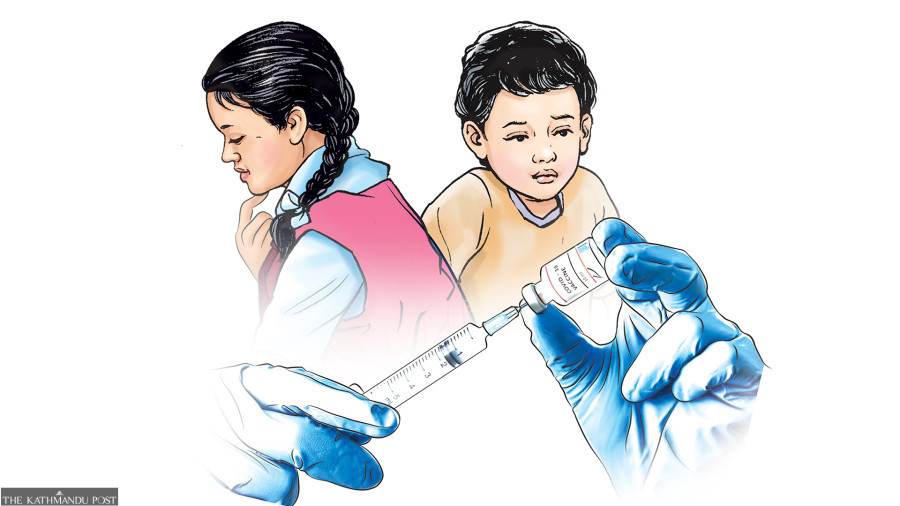Health
Nepal declared fully immunised, but experts suspect data manipulation
Scepticism stems from lack of independent verification and global recognition of the claim. Doctors warn such claims could create a false sense of security among public.
Arjun Poudel
Nepal witnessed a massive measles outbreak in 2022 and 2023. But on Monday, the Ministry of Health and Population declared all 77 districts of the country ‘fully immunised and sustained’ with much fanfare. Experts on child health and immunisation have expressed serious doubts about its veracity.
‘Fully immunised and sustained’ means all children under 15 months of age in the country have been administered all routine vaccines, which is impossible in such a short period, according to them.
Experts warn that the government data lacks independent verification and is contradicted by recurring outbreaks of vaccine-preventable diseases. They also caution that achieving full immunisation status is a continuous challenge due to gaps in coverage and continuous births.
“How can it be possible to administer all eligible children with all routine vaccines in a year?” questioned Dr Shyam Raj Upreti, former director general of the Department of Health Services. “If it were so simple, the country would have achieved the target long ago. We should not forget that administrative data, which could have been manipulated, is not acceptable for declaring progress.”
The Health Ministry started declaring fully immunised villages some two decades ago as a pilot project to boost the coverage of the routine vaccines. Without assessing the success of the pilot programme, health authorities extended it throughout the country.
Health officials admit that no independent assessment has been carried out to verify the claim that all eligible children in the country have been inoculated with routine vaccines. Studies carried out in the past, including the Nepal Demographic and Health Survey-2022, conducted by the Ministry of Health and Population, showed that at least four percent of children aged 12 to 23 months have received no vaccination.
The number of children missing basic antigens under the routine immunisation programme in Madhesh province was also staggering—there was only a 68 percent coverage rate, which means 32 percent of children in the province had not received all vaccines. This is the lowest among all the seven provinces. However, within a year, the immunisation Section under the Family Welfare Division certified the Madhesh province as fully immunised.
“A budget was allocated for the celebration of ‘fully immunised and sustained’ and the celebration event has been held just to exhaust the allocated budget,” an official at the Department of Health Services said, asking not to be named, as he feared retribution for speaking out. “There is no relation with the declaration of ‘fully immunised and sustained’ and actual immunisation of unvaccinated children.”
Thousands of children were found across the country who had either not received a single dose of vaccine or had missed some routine antigens, during the campaign launched after the NDHS report was published.
Nineteen districts of six provinces—Koshi, Madhesh, Bagmati, Lumbini, Karnali, and Sudurpaschim province—witnessed a measles outbreak in 2023. At least one died, and 1,300 others were infected with the deadly virus at the time. Most districts that saw the measles outbreak were declared fully immunised before the outbreak. Health officials from the disease-hit districts admitted that gaps in vaccination were exposed only after the outbreak.
“Neither any international health agencies nor any country in the world has appreciated the success claimed by the Nepal government,” said Upreti, who is also a child health expert. “Without setting up a robust surveillance mechanism for independent verification, the claimed success will not be lasting. It will create a sense of complacency in public.”
Nepal had declared the entire country open-defecation-free years ago, but outbreaks of waterborne diseases, including diarrhoea and cholera, have not stopped. Experts say many districts have been declared fully literate but it is hard to believe that all the districts are indeed fully literate.
Experts say it is impossible to achieve ‘fully immunised’ status, as babies are born every hour and every day. They say that childhood vaccination is a continuous process, which never ends, meaning that the target is never fully achieved.
“Floating populations, scattered slums, working-class people, internal and external migration, lack of awareness and lack of awareness always pose a challenge for health care programmes,” said Dr Yasho Vardhan Pradhan, former director general at the Department of Health Services. “Officials are claiming that they achieved a hundred percent result in routine vaccination. If so, why does the administrative data show gaps every year?”
Childhood immunisation is the number one priority of the government, under which 13 types of vaccines are administered free of cost against a range of diseases, including measles-rubella, pneumonia, tuberculosis, diphtheria, pertussis, tetanus, hepatitis B, rotavirus, Japanese encephalitis and typhoid.




 14.12°C Kathmandu
14.12°C Kathmandu















